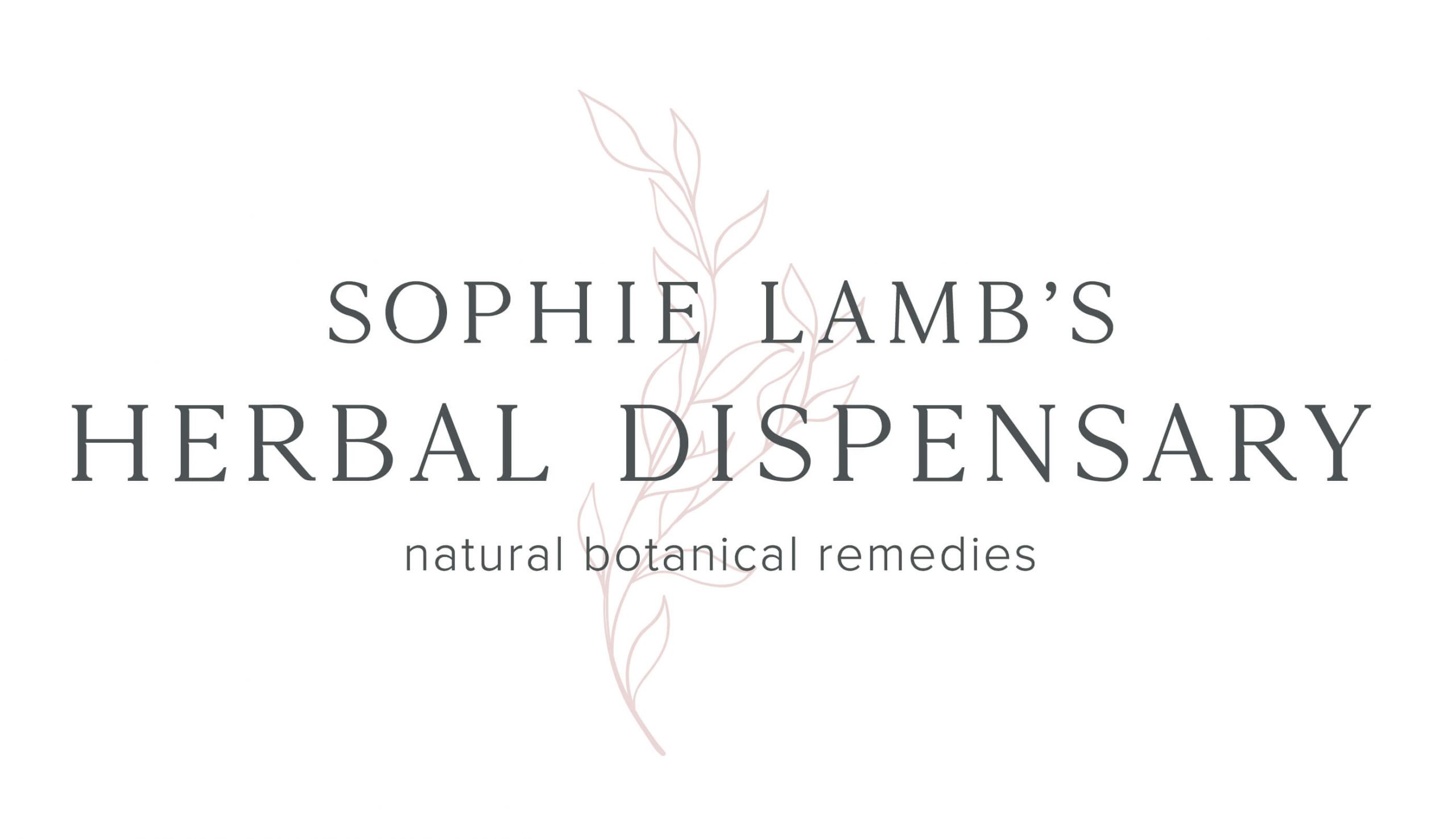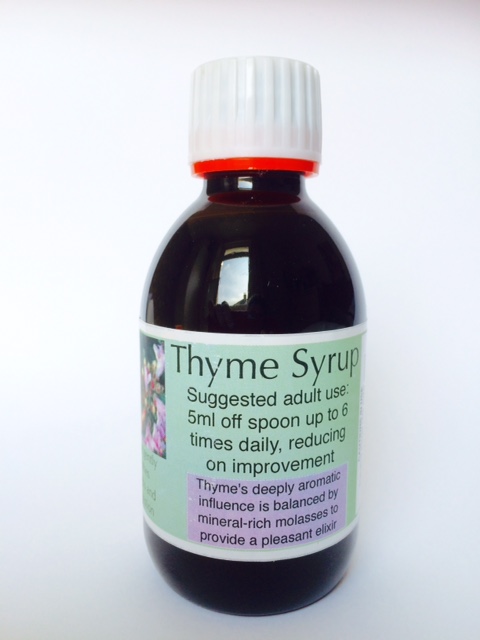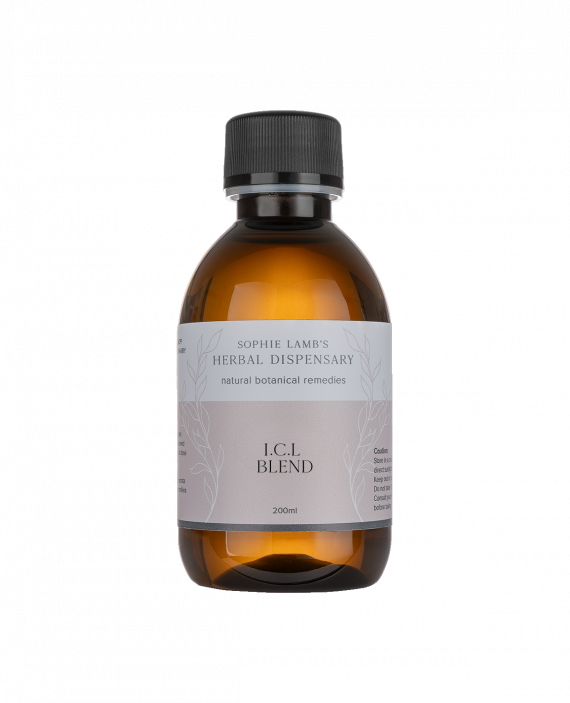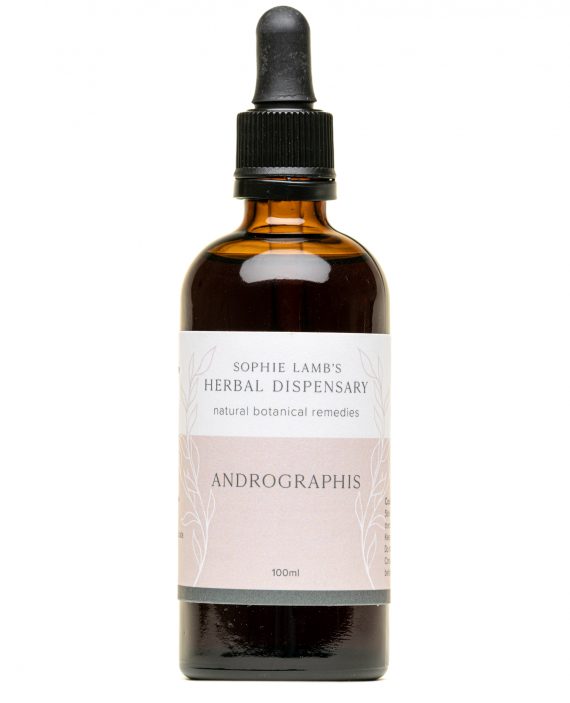Description
If ever a plant was created for the lungs it was thyme. The more you understand about the awesome design of the lungs and the actions of thyme, the more that thyme appears to have been made for the lungs, like hand in glove. It is a traditional remedy for the lungs and also has a positive effect on the digestive system.
But before you read about how thyme helps, have a look at what these returning customers say:
“My family have been using Thyme syrup for a while now including my baby and toddler. It really helps to soothe and loosen a tight chesty cough and I wouldn’t be without it in my medicine cupboard. Along with Echinacea I believe it has probably prevented the use of antibiotics at times” E.Barclay
“A friend suggested I try Thyme Syrup last winter when nothing worked on my seasonal cough. If my asthma flares up I find myself on a lot of medication and the natural ingredients are amazing. Soothing, works within hours, value for money and tasty too. Not like over the counter medication from chemist. Wonderful and speedy & professional service. “ Katie, Wirral
“Several years ago I had a severe chest infection, following which I suffered a shortness of breath if I climbed stairs or walked more than a very short distance. Having visited the GP, and been sent for a spirometry test to check my lung health/function, I was diagnosed with Chronic Obstructive Pulmonary Disorder (COPD). At the time I was 68 and given a lung age of 76 years. This is an irreversible, degenerative condition and only the symptoms can be treated. Shortly after I was recommended by a family member who used Thyme Syrup that should try it for my condition. I take Thyme syrup three times daily. Six months later I went for my spirometry test and the nurse made me repeat the process a couple of times because she could not believe the results – I had a lung age of 60 years and my lung health showed no signs of the symptoms of COPD. I have continued to take Thyme syrup regularly and have not suffered shortness of breath or severe chest infections since I started.” P.Mason
“I would not be without this product for my family. If a cough is doing the rounds, as it often is, then this product is an absolute must have”. SM
“A very effective remedy. Stopped the beginnings of a chesty cough for both my daughter and myself recently. Always have a bottle at home.” J.Hagger
“Cleared up my cough in no time.” J.Henderson
“My girls absolutely love this, they ask for this all the time (even when they are well!!!) and this was so helpful when they had whooping cough recently”. D.Williamson
“My youngest son had a weakness for severe coughs and any cold seemed to go to his chest when he was a toddler. I’m not a fan of giving my children antibiotics or inhalers and fortunately at a time when I was feeling pressure to take this route, I was recommended Thyme syrup and it changed everything. From sleepless nights, a mattress propped up at one end and endless coughing sometimes leading to vomiting, I gave him three spoonfuls of Thyme syrup each day and within a week his cough had abated. Now, every time either of my children has a cold which threatens to go to their chest or they complain of a cough or sore throat, I immediately start them on Thyme syrup – it works as an expectorant and loosens everything. Best of all they quickly recover without need of antibiotics or any other prescription medicine. It really has made such a difference for my boys … I am a true advocate of Thyme syrup! ” Jo.H
“It helps my chesty cough a lot. Far better than anything else I have tried” L.M from Turriff
“It’s a life saver. I have been taking it for 2 years. It has helped me so much with my breathing and cleared my sinusitis. I can’t recommend it highly enough.” A.Benson, Kent
“Thyme Syrup is the only cough mixture I’ve found that truly does stop the cough and ensure a good night’s sleep. It’s amazing!” Mairi
“We first purchased thyme syrup to help clear up our 18 month olds chesty cough and we are so glad we did. It helped clear his stubborn cough and then we used it again when the little one came down with croup. Croup can be a frightening illness but we were confident that the Thyme Syrup was helping ease the seal bark type cough and it passed relatively quickly. Now we are never without a bottle in the cupboard! We would recommend it to anyone as a staple in your medicine cabinet.” M.Brown, Glasgow
“Liquid gold, wouldn’t get through the winter without it.” Mandy Mowat, Caithness
“This is always in my cupboard on standby. Definitely works. I recommend it to lots. Wouldn’t buy anything else.” Alison Mackay, Wick
“Is is very good. Best cough medicine I have tried.” Jayne Henderson
“After a week of worsening coughing, Thyme Syrup sorted it in 48 hours.” S Brown, Kent
“My five year old son loves the taste so much he asks for more and it’s eased his persistent cough within a couple of days.” G Buckland, Tunbridge Wells
“Thyme syrup is amazing. I’m not quite sure how my family and I did without this medicine before. It relieves a cough and cures it so quickly. I cannot recommend it highly enough!” S Munn, Kent
“Thyme syrup is the only cough medicine I’ve bought for years now. It’s great for the whole family. I swear by it for the kids – it really does make a difference. And I love that the ingredients are natural. I always have a bottle in the cupboard”. K Mackay, Wick
“Thyme Syrup is not only soothing to my son’s chesty cough but is used on a regular basis by the whole family. I could not recommend this natural remedy more. It’s a must for the remedy cabinet in our house” Vanessa Bassett, Kent
“Best cough syrup ever. I have bought it and recommended it to loads of friends. I always keep a bottle of it in the fridge”. Liz Gray, Inverness
“Recently bought this for my 94 year old Mum who was sceptical but now converted! Got completely rid of her awful chesty cough, brilliant stuff!” Susan Rainbow, Thurso
“Thyme Syrup for me has been a godsend. I’ve had a bad cough for months now, because of COPD – it would not go away. But after reading reviews on your website I tried it. Four weeks later, my cough is nearly gone and my chest doesn’t feel so tight. Amazing stuff, I won’t be without it now!” Wendy Irvine, Thurso
“Thyme Syrup worked really well for my daughter’s cough and it also helped my sore throat. I will always keep a bottle in my house.” Helen Donn, Caithness
“Throughout my first year of high school I had a continuous need to clear my throat and also was very congested. I started taking Thyme Syrup and within a week I no longer felt congested or the need to clear my throat.” Sean Reid, Caithness
“Since I started taking Thyme Syrup I have been able to reduce the usage of my inhalers. At the moment I am not taking serotide inhaler or my ventolin during the day.” Mrs B. Mackenzie, Caithness
“I have been taking thyme syrup for a while now and would never be without it in our cupboard. I instantly notice a difference while taking it to get rid of chesty coughs. My son also loves taking this syrup.” G. Coghill
“I was diagnosed with bronchiectasis in early 2011. The disease causes exacerbations usually on a regular basis that take the form of congestion of the lung or lungs that are accompanied by depression, a feeling of fatigue and deep coughs on regular intervals to loosen the congestion. In my case the exacerbations occurred at intervals of 3 months. Such high incidents made me a candidate for 2 weeks in hospital having antibiotics fed intravenously, despite having taken a course of antibiotic capsules during the exacerbations. Antibiotics are vitally important in treatment of many diseases and it would be extremely foolish to deny there effectiveness but they do have limitations. Misuse can result in them becoming less effective and producing unwelcome side effects as with most medications. Prior to the arrival of penicillin chemists nationally carried stocks of thyme syrup that was and still is an excellent decongestant with soothing properties. I thought to myself could thyme syrup perhaps help break the quarterly exacerbations of bronchiectasis and who should l turn to for advice?
I was made aware of Sophie Lamb’s professional consultancy and the lengths to which she and her family would go to bring a new awareness of the value of herbs in treating complex ailments along side modern medical practice and decided to make contact. There was always a chance that thyme syrup would break the boringly regular debilitating incidence of bronchiectasis exacerbations. I have now been taking thyme syrup regularly for the last 12 years, I have not had a full on attack for 3 years and prior to that l experienced a steady reduction in the frequency and disabling effects of the disease.
I have two people to thank Sophie of course but also a chap called Hippocrates who documented the value of thymus vulgaris over 2000 years ago.” Tony
Thyme Heals
Thymus vulgaris has been used for centuries for acute and chronic respiratory diseases due to Thyme’s numerous actions on the lungs:
- EXPECTORANT medication that helps expel mucus from the lungs
- ANTISEPTIC antibacterial, antiviral and antifungal
- ANTISPASMODIC relaxes smooth muscle of the lungs
- ANTITUSSIVE reduces cough reflex
Traditional uses of Thymus vulgaris – the active ingredient of Thyme Syrup
- bronchitis
- whooping cough
- asthma
- bronchitis
- laryngitis
- pharyngitis
- chronic cough
- catarrh
- common cold
The rise and fall and rise again of Thyme Syrup
The famed British Pharmaceutical Codex 1934 gave a recipe for Thyme Syrup and every doctor prescribed it and chemists dispensed this valuable herbal elixir. The discovery of antibiotics soon pushed this and many other ‘simple’ remedies off the shelves. Whilst antibiotics have saved millions of lives, we now realise that routine and over prescription has resulted in resistance to these drugs and the use of remedies such as Thyme Syrup still has a place. Although Thyme Syrup is based on the BPC 1934 the recipe has been extensively upgraded to incorporate new techniques. Molasses sugar is used for its rich spectrum of minerals and thyme is incorporated by means of a three stage process to retain all the virtues of the herb. Medical herbalists prescribe extracts of Thyme for whooping cough, asthma, bronchitis, laryngitis, pharyngitis, catarrh and the common cold.
Medicinal herbs are man’s oldest form of medicine and approximately 80% of the world’s population still use herbal medicine as their primary healthcare. There is an ever increasing body of scientific evidence validating the historical medical uses of plants such as Thyme. But this should come as no surprise as approximately half of all drugs today have their origins in a discovery made in a plant.
Science confirms you are not wasting your Thyme
The principal components of thyme are carvacol, borneol, geraniol and thymol, the latter being the most researched for its known antiseptic and anti-fungal characteristics.
Thyme’s direct effect on the lungs
Thymol (the essential oil component of Thyme) is detected in the breath after oral administration. In treating acute and chronic respiratory ailments such as bronchitis, the effectiveness of preparations containing thyme essential oil depend on bioavailability at the bronchial mucosa. After oral administration of tablets or capsules containing a thyme dry extract to healthy volunteers the first traces of thymol were detected in exhaled air (using sensors fitted to a gas mask) after 30 and 60 minutes respectively.
Expectorant
Thyme extract was found to stimulate the mucociliary escalator which is a major defense against infections. The mucociliary escalator refers to barrier cells that line the upper respiratory tract. The cells produce mucus which contains chemicals, antibodies and immune cells to destroy any bacteria and viruses that become trapped. The barrier cells also have hairs, or cilia, which beat upwards, sweeping debris out of the respiratory tract, hence the term muco-ciliary escalator.
“Changes in the symptoms of cough after treatment with a combined herbal preparation containing dry ivy leaf extract as main active ingredient, decoction of thyme and aniseed, and mucilage of marshmallow root and its tolerability were investigated in an open clinical trial on 62 patients with a mean age of 50 years (range 16-89) with irritating cough in consequence of common cold (n = 29), bronchitis (n = 20) or respiratory tract diseases with formation of viscous mucus (n = 15). The mean daily intake was 10 ml (range 7.5-15) of syrup, and the mean duration of treatment was 12 days (range 3-23 days). All symptom scores showed an improvement as compared to baseline.” http://www.ema.europa.eu/docs/en_GB/document_library/Herbal_-_HMPC_assessment_report/2009/12/WC500017944.pdf
Antispasmodic
Spasmolytic activity of the flavonoids from Thymus vulgaris
Impact of thymol in thyme extracts on their antispasmodic action and ciliary clearance.
Thyme extract, but not thymol, inhibits endothelin-induced contractions of isolated rat trachea.
Antibacterial
Ancient Egyptians used Thyme extracts as an embalming ingredient because of its strong antibacterial and antifungal properties.
In vitro inhibition of Helicobacter pylori by extracts of thyme.
Thyme essential oil has also been found to inhibit Staphylococcus aureus and Escherichia coli.
Antifungal
Thymes potential use in protecting against particulate matter in diesel fumes and other air pollutants
Diesel fumes are now recognised as a major carcinogen and also the cause of at least 7% of heart attacks in cities. The fumes contain particulate matter (PM) and are quoted for example as PM10 and the 10 refers to 10 millionths of a metre. PM10’s are inhaled into the lungs and can cause seriousdamage to the lungs, but the smaller PM2.5’s pass through the lung tissue and into the blood circulation. Even short-term exposure to PM2.5 over a few hours can trigger myocardial infarctions,cardiac ischemia, arrhythmias, heart failure, stroke, exacerbation of peripheral arterial disease, and sudden death. Thyme’s stimulatory effect on the muco-cilliary escalator may provide unique protection against environmental air pollutants, by the expectoration and removal through protective mucus secretion and activation of the hair-like cilliary escalator, moving the trapped particles upwards and outwards.
Suggested adult use:
5ml one to six times daily off spoon. Reduce on improvement.
Do not exceed recommended dose
Ingredients:
Spring water, cane molasses sugar, Thyme (Thymus vulgaris). 200ml
Cautions:
Do not take if pregnant or breastfeeding.
Consult your medical practitioner before taking.
Keep out of reach of children.
Store in a cool dry place out of direct sunlight.







Reviews
There are no reviews yet.